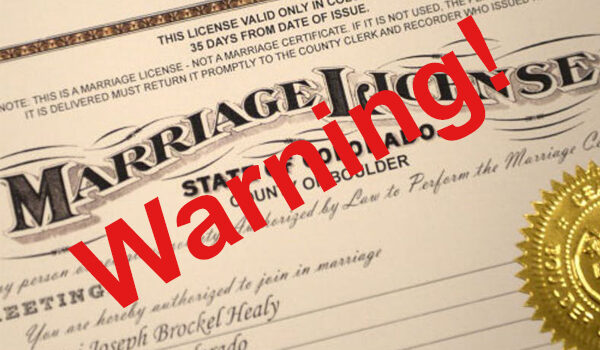
In our practice, which deals solely with family law matters, we often have people make the statement, “If it had been as difficult to get married as it is to get divorced, maybe I wouldn’t have married.”
Marriages are made with the intention and expectation that they will last forever (“Till death do us part”). Before marrying, hardly anyone thinks about what it would be like if they divorced their future spouse or what the issues would be if their future spouse divorced them.
Should A Marriage License Come With Warnings?
Some people though, especially those who have already been in a prior marriage and want to protect assets to give to their children from that marriage, consider a prenuptial or “ante-nuptial” agreement. However, the average person who has never been married doesn’t even contemplate that their upcoming marriage may someday end. They also don’t probably imagine what that ending might entail.
Unfortunately, as we all know, about half of all marriages do end. So, the question is whether a marriage license should come with warnings about what may be lurking in the future if one is unfortunate enough to be in one of the marriages which may end.
On the subject of prenuptial agreements or “ante-nuptial” agreements, if a person is creating such an agreement with a good attorney, he/she is led through the rights and obligations which would be considered by a divorce court to have arising by virtue of the marriage and is informed of what generally would happen in a divorce, under the law, regarding pre-marital property, marital property, gifts, inheritances, spousal support (or alimony), retirement funds, debts, and child custody as well as support (if applicable).
If a potential spouse is not involved, though, in considering a prenuptial agreement, they probably have no idea of what might be involved in the case of a divorce.
Apparently, no state has any type of warnings or fact sheet which is issued with a marriage license, although in Florida license applicants must read a Family Law Handbook covering rights and obligations which may arise from living in a marital relationship.
In California, a California Senator, Hanna-Beth Jackson (an attorney who has practiced family law in the past), has proposed a bill (Senate Bill 927) which would create a “fact sheet” outlining the obligations of married people to each other, at least under California law. The Senator has spoken of the “lifetime” contract into which the two parties to a marriage are entering and has pointed out that most people would not enter into a contract of any kind, for life, without considering all the ramifications.
The Senator’s proposed law would require the creation of a pamphlet that lists how marriage and divorce could affect things such as property ownership, rights in each other’s retirement savings and retirement plans, alimony or spousal support, “spousal rape” and support obligations regarding children.
It is difficult to know whether people applying for a marriage license would really read and consider any warnings or information about the legal relationship created by marriage, or the potential rights and responsibilities of the parties to each other in the event of a divorce, but this one Senator is trying to make sure parties have that information “upfront.”
It might be interesting for the State of Florida to survey people in divorce actions there to see if they read the pamphlet the State required them to read if they obtained their marriage license in Florida and to determine whether they really thought about what the pamphlet was outlining at that time or whether anything in the pamphlet made a difference.
Or, perhaps the State should try to survey people who had applied for a marriage license and then did not go through with the marriage, asking them if the pamphlet had anything to do with the marriage not taking place.
There is nothing wrong with one knowing what rights and obligations he or she will have if they enter into a marriage and knowing what rights and obligations they would have if the marriage were to ever end through a divorce. Don’t think that everything you earn while you are married is yours, or your separate property.
You would be incorrect in assuming that. There are many other things we have heard in our practice which people assume and which, in common logic may seem absolutely logical. Unfortunately, some of those assumptions are “legally” incorrect.











Add A Comment